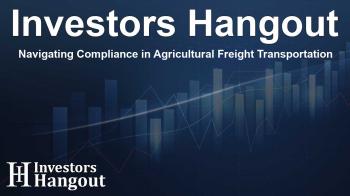Navigating Compliance in Agricultural Freight Transportation

Navigating Compliance in Agricultural Freight Transportation
In the agricultural sector, approximately 70% of freight is moved by truck. This significant statistic highlights the critical role that transportation plays in supplying food and resources. With such a high dependency on trucking, observance of freight compliance has emerged not only as an operational necessity but also as a key strategic factor for agribusiness leaders.
Rising Complexity in Freight Compliance
A shift in the regulatory landscape, coupled with increased insurance costs and legal responsibilities, is reshaping how agricultural businesses operate their transportation networks. Producers, processors, and suppliers must now engage in more intricate planning to manage risk effectively.
The influx of freight coupled with intensifying scrutiny from organizations such as the Federal Motor Carrier Safety Administration (FMCSA) is creating a challenging environment. Notably, some recent court rulings have seen verdicts reaching millions of dollars based on instances of negligent hiring. This escalation has made compliance a focal point for all stakeholders involved.
Legislative Changes Impacting Costs
There are significant discussions regarding proposed changes that would elevate FMCSA minimum liability coverage from $750,000 to as high as $5 million. Such changes could profoundly alter the financial landscape for carriers, resulting in higher insurance premiums and operational costs across the board.
Moreover, enforcement related to commercial driver's licenses (CDL) is becoming increasingly stringent. Automated checks have already resulted in thousands of certificate revocations in various key markets due to failure to meet newly established medical and language proficiency regulations.
The Importance of Timely Deliveries
In the agricultural industry, timely deliveries are integral to business operations. A single compliance slip can have far-reaching consequences, causing delays in shipments and disrupting established supply chains. To counteract this issue, agribusinesses are implementing stricter oversight measures over their carrier partners.
This includes conducting thorough pre-dispatch checks, setting clear compliance benchmarks, and leveraging digital tools for real-time monitoring. With these measures, agribusinesses are striving to maintain efficiency while safeguarding their operational integrity.
Building Trust Through Compliance
Ben Sloan, Vice President of Transportation Management at Ever.Ag, emphasizes the critical role of transportation compliance in protecting both financial margins and customer trust. He notes, "Whether you're hauling corn or cattle, every mile now carries more legal and financial weight than ever before." This statement captures the essence of today's freight environment, where compliance has become a baseline expectation rather than merely an operational task.
Embracing a Smarter Transportation Approach
In the contemporary agricultural economy, efficient transportation transcends just being fast or cost-effective. It has evolved into a practice that necessitates safety, accountability, and verification at every stage—from the initial field to final delivery.
As the regulations surrounding freight continue to evolve, businesses must adapt to remain viable within their respective markets. Smarter hauling strategies are paramount, ensuring that agricultural entities can operate with greater accountability while meeting the ever-increasing expectations placed upon them.
Ever.Ag's Role in the Industry
Ever.Ag stands at the forefront of this evolution, offering innovative AgTech solutions aimed at enhancing connectivity and efficiency across the agricultural supply chain. The company is dedicated to empowering farmers and producers with market intelligence, risk management resources, and cutting-edge software solutions. These innovations drive smarter decision-making and contribute to sustainable operational practices across various sectors, including dairy, livestock, and crops.
The goal is clear: to enable producers, processors, and industry partners to make informed choices that ultimately improve efficiencies and support the goal of adequately feeding a growing global population.
Frequently Asked Questions
What is the primary mode of transportation for agricultural freight?
Approximately 70% of agricultural freight moves by truck, making it a critical aspect of supply chains.
Why is compliance crucial in agricultural freight?
Compliance is vital to mitigate legal and financial risks, ensuring timely deliveries and maintaining supply chain integrity.
What are the potential impacts of increased FMCSA liability coverage?
Raising the FMCSA liability coverage could significantly increase insurance premiums, impacting the transportation costs for carriers.
How are agribusinesses addressing compliance challenges?
Agribusinesses are tightening carrier oversight through pre-dispatch checks, compliance standards, and real-time digital monitoring tools.
What does Ever.Ag provide to the agricultural sector?
Ever.Ag offers innovative AgTech solutions that enhance efficiency, market intelligence, and risk management throughout the agricultural supply chain.
About The Author
Contact Caleb Price privately here. Or send an email with ATTN: Caleb Price as the subject to contact@investorshangout.com.
About Investors Hangout
Investors Hangout is a leading online stock forum for financial discussion and learning, offering a wide range of free tools and resources. It draws in traders of all levels, who exchange market knowledge, investigate trading tactics, and keep an eye on industry developments in real time. Featuring financial articles, stock message boards, quotes, charts, company profiles, and live news updates. Through cooperative learning and a wealth of informational resources, it helps users from novices creating their first portfolios to experts honing their techniques. Join Investors Hangout today: https://investorshangout.com/
The content of this article is based on factual, publicly available information and does not represent legal, financial, or investment advice. Investors Hangout does not offer financial advice, and the author is not a licensed financial advisor. Consult a qualified advisor before making any financial or investment decisions based on this article. This article should not be considered advice to purchase, sell, or hold any securities or other investments. If any of the material provided here is inaccurate, please contact us for corrections.

